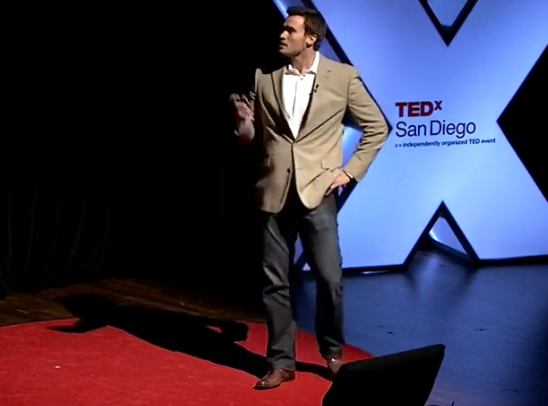Two years ago, after having served four years in the United States Marine Corps
兩年前,我在美國海軍陸戰隊服役了四年
and deployments to both Iraq and Afghanistan,
也曾調配到伊朗和阿富汗
I found myself in Port-au-Prince, leading a team of veterans and medical professionals
我被安排到太子港領導一支由退役軍人和醫療專業人員組成的隊伍。
in some of the hardest-hit areas of that city, three days after the earthquake.
就在地震剛過去三天,我到達這座城市受災害最嚴重的一些地區里。
We were going to the places that nobody else wanted to go,
我們去了沒有任何人想要去的地方,
the places nobody else could go, and after three weeks,
也沒有任何人能夠去的地方。三周過后,
we realized something. Military veterans are very, very good at disaster response.
我們意識到,那些退役軍人非常善于應變災難。
And coming home, my cofounder and I,
回來過后,我和我的伙伴
we looked at it, and we said, there are two problems.
審視了情況,發現兩個問題。

The first problem is there's inadequate disaster response.
第一個問題,危機處理不妥當
It's slow. It's antiquated. It's not using the best technology, and it's not using the best people.
速度太慢。方法過時。科技并非最先進的,也沒有最完善的團隊
The second problem that we became aware of
我們意識到的第二個問題是
was a very inadequate veteran reintegration,
沒有好好融合退役軍人
and this is a topic that is front page news right now
現在這個議題上了頭條
as veterans are coming home from Iraq and Afghanistan,
當軍人從伊拉克和阿富汗退役回來
and they're struggling to reintegrate into civilian life.
他們都很難重新融入普通人的生活
And we sat here and we looked at these two problems,
所以我們仔細地研究了這兩個問題
and finally we came to a realization. These aren't problems.
終于我們的結論是,這些并不是問題
These are actually solutions. And what do I mean by that?
而是解答。我指的是什么呢?
Well, we can use disaster response as an opportunity for service for the veterans coming home.
首先,對退役軍人來說,災難管理是一個機會
Recent surveys show that 92 percent of veterans want to continue their service when they take off their uniform.
近來調查發現有92%的退役軍人愿意在退役后繼續服務社會
And we can use veterans to improve disaster response.
我們可以讓退役軍人改善賑災行動
Now on the surface, this makes a lot of sense, and in 2010, we responded to the tsunami in Chile,
初步看來,這是理所當然不過了。在2010年,我們已經派遣救災隊前往援助
the floods in Pakistan, we sent training teams to the Thai-Burma border.
智利海嘯、巴基斯坦水災,也派培訓隊伍到泰緬邊境
But it was earlier this year, when one of our original members caused us to shift focus in the organization.
但卻是在今年不久前,一位前隊員導致我們轉移了組織的方向
This is Clay Hunt. Clay was a Marine with me.
他就是克萊·亨特。克萊是我的海軍伙伴
We served together in Iraq and Afghanistan.
我們一起在伊拉克和阿富汗服役
Clay was with us in Port-au-Prince. He was also with us in Chile.
在太子港和智利,他也和我們同在
Earlier this year, in March, Clay took his own life.
不久前,克萊自殺了
This was a tragedy, but it really forced us to refocus what it is that we were doing.
這是個悲劇。不過卻讓我們重新思考我們的方向
You know, Clay didn't kill himself because of what happened in Iraq and Afghanistan.
克萊并非為了在伊拉克和阿富汗所發生的事情而自殺。
Clay killed himself because of what he lost when he came home.
反而是為了回家后他所失去的一切而自殺
He lost purpose. He lost his community.
他失去了生命目標。他失去了他的社群。
And perhaps most tragically, he lost his self-worth.
最悲慘的是,他失去了自我認同。



